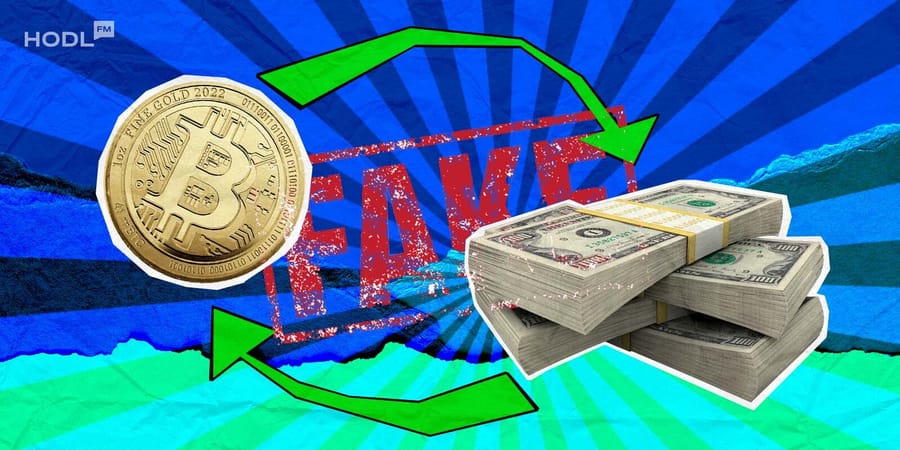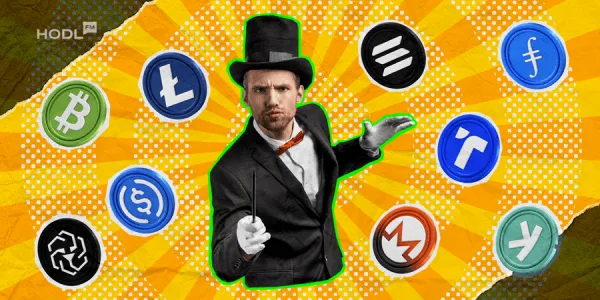Crypto moves fast, and unfortunately, so do scams. One of the biggest threats out there? Fake crypto exchanges.
They look real, with slick design and “guaranteed profits,” but once you deposit, your funds get trapped, withdrawals are blocked, and support vanishes.
These scams have stolen billions of dollars by using fake endorsements, fake volumes, and phishing tricks. This guide will help you spot red flags, show you the biggest crypto scams, give you our list of frauds for 2025, and teach you how to protect yourself because one wrong click in crypto can cost you everything.
What Makes a Crypto Exchange Fake?
A fake crypto exchange might look real at first glance, with a clean design, well-known branding, and even a professional logo. But there isn't a real trading system behind the shiny front, and there isn't any regulation, and they don't want you to be able to take your money out.
Some crypto exchange scammers just take your money and block withdrawals, while others run fake crypto wallets or mining operations to steal your keys and money. If you connect your wallet, your money can disappear right away. When you give them your private keys, they can steal everything, even your identity.
What are the red flags? No license, fake security, mystery teams, suspiciously high volumes, and never-ending withdrawal drama. Scammers copy trusted brands, flood the web with fake reviews, and push limited-time offers to rush you. Sometimes, as in pig butchering scams, they play the long game, luring you into bigger deposits before taking it all.
Largest Incidents of Fake Crypto Exchanges
Many fake platforms go unnoticed, but some cryptocurrency scam examples have made headlines worldwide and caught regulators' attention. These cases demonstrate how convincing, dangerous, and costly fake exchanges are.
WEX (Formerly BTC-e)
WEX emerged from BTC-e, a popular exchange shut down in 2017 for money laundering. WEX promised users that the "new and improved" version was real. Nothing changed; it just repeated. As the platform collapsed in 2018, its owners fled with hundreds of millions of dollars in digital assets. Many believe it was BTC-e's illegal business under a new name.
QuadrigaCX
In 2019, the Canadian exchange QuadrigaCX went out of business in strange ways. It is said that founder Gerald Cotten died while traveling in India, taking with him the only way to get to the exchange's cold wallets. Later investigations showed that there was a lot of bad management, and about $190 million in customer money was missing. It was advertised as a legitimate platform, but it worked more like a Ponzi scheme, taking new deposits to pay out old ones.
PlusToken
PlusToken was a fake wallet and investment platform that ran from 2018 to 2019. It was one of the biggest cryptocurrency investment scams ever. It promised huge profits for holding and investing in its token. In reality, it was a fraud that took more than $5.7 billion from investors all over the world. When the operators disappeared, so did the money, which shook the trust of the whole industry.
Thodex
Thodex, a Turkish exchange, suddenly stopped trading in April 2021. Not long after, its CEO, Faruk Fatih Özer, is said to have left the country with about $2 billion in customer assets. The event led to international arrest warrants, many arrests of employees, and a lot of attention on unregulated exchanges in emerging markets.
JPEX
JPEX advertised itself as a licensed trading platform with the help of influencer promotions and fancy PR campaigns. It was not registered and was breaking the law behind the scenes. Hong Kong police received over 2,300 complaints, estimating user losses at $178 million. After that, many people were arrested, and the police took luxury cars and cash that were linked to the scheme.
MTFE
The MTFE app promised AI-powered crypto trading, good branding, and lots of positive online reviews (most of which were fake). It disappeared overnight after being heavily advertised in West Africa and Southeast Asia. It is thought to have taken $1 billion in deposits. The sudden departure left tens of thousands with no options.
BKEX
BKEX, which is based in the British Virgin Islands, stopped withdrawals because they were "investigating user fund laundering." Many people think the platform was a fake exit scam instead of a real freeze because millions of dollars are locked up for an indefinite amount of time, and there is no clear information about how the process works.
Zipmexpro.com
This phishing scheme used the branding of the real Zipmex exchange to trick people. Offers of trading advice and "insider signals" drew victims in. To build trust, early withdrawals were allowed, but when users put more money into the platform, it stopped all withdrawals and went offline.
GreedyBear
Some fake exchanges don't look like full-fledged trading platforms; some are hidden in your browser. GreedyBear, a group of hackers, stole more than $1 million by combining more than 150 fake crypto wallet extensions with malware and high-end phishing sites. These bad add-ons pretended to be safe wallets like MetaMask and TronLink. They passed browser store reviews before becoming tools that stole credentials. GreedyBear showed that fake crypto websites and wallets can be just as bad as a scam exchange when you add in malware like LummaStealer and AI-generated code.
Chirag Tomar
Chirag Tomar made $20 million by making fake Coinbase login pages that showed up higher in search results than the real site. Thousands of people entered their login information, but they were sent to fake "support" lines where scammers tricked them into giving them security codes or remote access, which emptied their wallets. Tomar spent a lot of money on expensive cars and real estate with the money he stole. He was arrested in the U.S. in late 2023. Indian authorities took $4.8 million in assets linked to the scam in 2025, and more investigations are still going on.
List of Fake Crypto Exchanges
Below is a consolidated list of fake trading websites and platforms that have been reported, flagged, or exposed as cryptocurrency scams. If you see any of these names in the Bitcoin scammer list below while searching for a place to trade, stay away.
- 247 Trade Growth (247tradegrowth.net)
- 88 Trading LLC (DBS Bank impersonation)
- A16Zcrypto (a16zcrypto.cc, a16zcrypto.buzz, a16zcrypto.com)
- AlphaWallet.net
- Amead Digital Currency Co., Ltd. (tyshw.com)
- AnaBrokersTrade / Becky Bitcoin Analyst Trader
- Apyeth Gifts (apyeth.gifts)
- Aspro ex (asproex.com)
- Atmos NOAH Cryptocurrency Investment Group
- BakerySwap (bac-snx.com/bakery/BAKEV2/SNX)
- BC Group (bcgros.vip, bcgmnt.vip, bcgmts.vip)
- Bezop
- BIPPAX
- Bitcoin Bonus (pro-btmining.site, MineSlot.site, RedParNet.site)
- Bitcoin Revolution
- Bitcoin Vest Cloud (bitcoinvestcloud.com / Cryptovestcloud)
- Bitcoin-win.com
- bitcoinfied.com
- BitcoinGoldScript.com
- BitcoinPrime.io
- Bitconnect
- Bitglobal / Bit Global Options (bitglobaloptn.com, bitglobaloptions.com)
- bitso-crypto.top
- Bityard (bityardpro.com / bityardit.com)
- BravoFX
- BTCRevolution.cloud
- BuyBitcoinMining.io
- bybpoz.com / imxofz.vip (romance scam link)
- Bytobit.com (bytobit.com, ceggcc.vip)
- CDFXTrade.online (romance scam link)
- cglobalw.com (Entity impersonating CoinW)
- Changellytrade.com (Changelly impersonation)
- Clubillion.io Scam
- CME Coin VIP (cmecoinvip.com, fileserverj.com)
- Coin Pro X US (coinproxus.com)
- Coinegg (ceggcc.vip)
- CoinList Ro
- Coinrus.com (Entity impersonating Korean exchange Coinone.co.kr)
- CoinWpro (coinwpro.xyz)
- Copper Crypto (Entity impersonating Copper Technologies)
- CryptoCoinXchange.com
- CryptoComSite.com (phishing)
- CryptoJunkies
- CryptoMiningMachines
- CryptoPoint.Club
- CryptoWallet.com (phishing clone)
- Crystal Linkz FX / Crystal Linkz FX Link Zen (crystallinkzen.com)
- Dahua Top VIP / Dahuag VIP (dahuatop.com, dahuagvip.com, uobvip.com)
- Dapps-eth.io
- Dartya
- DCEX Exchange
- Defi Protocol (defi.wallet-usdt-eth.com, defi.wallet-usdt-erc20.com)
- Digi Coins
- Dilong Trading Limited / Affirm Rich Trading Company Limited
- Energise Trade (energisetrade.com)
- Entity impersonating Benito Revilla (benitorevilla.com)
- Entity Impersonating Coinhako (coinhakoxds.com)
- Entity Impersonating Kuna.io (www.kubhc.vip, www.kubkhy.vip/download)
- Entity impersonating Prosperous Group Ltd (prospers.business, profintech.live)
- Entity Impersonating Radiant Capital (appradiantcapital.com, appradiant-capital.org)
- ETH Finance (ETH-Finance.io)
- EtherDelta (hacked, now inactive)
- Ethereum X Corp
- ExNow (ExNow-Digital Currency Exchange)
- File Coins Foundation (File-coinfo.com)
- Foundry Pro Node Mining (foundrypro.net)
- FX Alliance Traders (fxalliance-trader.com / fxalliance-traders.com)
- FXCryptoClub.com
- GE Chains (gechains.com)
- Gemcoin
- Getbonusx2.com (getx2.net)
- Global tek Forex Trading
- gmelaunch.com
- Good-bookingline.com
- Hong Kong Selead Group Limited (hkselead.com)
- HOO Tech Ltd / HOO.com
- Hydefieco (hydefieco.com)
- I Texus Trade
- ICEX / ICEAX (icexas.com, iceax.com, icextee.top, icetrad.cc)
- Infinity Option (infinityoption.net)
- JessicaPTrades (Jessica) (romance scam link)
- John Joseph Travolta Imposter (celebrity impersonation scam)
- Julysil (multiple domains: julysil-support.com, julysil-bit.com, julysil-coin.com, julysil-pro.com, julysilcoin.com, julysilpro.com, juzhiju.com)
- Kenskr AI (kenskrksr.com)
- legalcryptocoinstrade.com
- Lidcoin Trading Center (also operates as lidcoin.vip / h5.lidcoin.vip)
- LIQULDOHN.COM
- Mana Pool (manapool-eth.com, www.manapool-eth.info)
- Mantao Network
- Micavhe.top
- Mindstoneltd.org (MindStone Technology Ltd)
- MT7 Coin (mt7coin.com)
- MUFG Pro (mu-fgpro.info, Mufg-Pro.com)
- Nasdaqon.com
- NYMEX impersonation (New York Mercantile Exchange)
- OpenSoil / Open Soil X (h5.opensoilx.com)
- OS Option Exchange (osoptionexchange.com)
- Penzo Limited (penzolead.com)
- Pinance.io
- Pines Investor Scam
- Poloina
- PoolinWallet.com
- Primegroup.global
- Privmoney (Private Money)
- Public Realm
- QuadrigaCX
- Rapid Forex Trade (RapidForexTrade.com)
- RB Hood impersonation (rbhoodc.com, rbhoodz.com, rbhoodd.xyz)
- Reliable Option Trade (reliableoptiontrade.com)
- Rhenium (Nodium)
- Rudolf Stark Pro Station
- Safepalesa.com
- Sheep Crypto Scam
- Spotalertweb.com
- Stunwill Ltd
- Sun Bit Proa
- Suniths Smith Gowda (individual scammer)
- Tahoe Digital Exchange (Tahoe-dex.com)
- The Big Mars (thebigmars.com)
- Thodex
- Tony Alin Trading Firm (tonyalinberker.com)
- Trade 1960 (trade1960.com)
- Trusted Stations
- Turbine Trade FideFX LTD (fiefx.cc)
- Turtsgrupfk.top
- UFCasino.website
- Unison FX Limited (unisonfx.com)
- Uniswap.LLC (uniswap.llc)
- Unix FX Trades (unifxtrades.live)
- us.gocoinoptions.com
- user.fcrown.info
- vexjex.cc
- VoyanX.com
- WEX Exchange (formerly BTC-e)
- Wexly.io
- Whitcoin Pro Exchange (Whitcoinpro.net)
- Whitemax.us
- Win Coining (wincoining.com)
- Wintermute impersonation (eth-wintermute.net)
- Wotoken
- X Coin Trading (xcoin-trading.com)
- XHEX
- Yo Bit Pro
How to Avoid Fake Crypto Exchanges
Fake platforms can look convincing, so the safest move is to slow down, verify, and never let FOMO push you into depositing funds. Here’s how to protect yourself:
- Check regulatory compliance. Use only exchanges licensed by trusted financial authorities and double-check those licenses on the regulator’s official website.
- Double-check the domain. Scammers use lookalike URLs (e.g., coínbase.com). So type the address yourself and avoid clicking random links in emails or ads.
- Research reputation. Google the exchange’s name with words like “scam” or “reviews” to see if others report issues like frozen withdrawals or poor support.
- Start with a small test. Before trusting the exchange with a lot of money, send a small deposit and try to withdraw it.
- Search for real security. Stick to platforms that have real third-party audits, 2FA, cold storage, and SSL encryption.
- Don't believe promises that aren't real. In a volatile crypto market, no real exchange offers "guaranteed returns" or "risk-free trading."
- Don't give in to pressure. Countdown timers, "exclusive offers," and urgent messages are all common tricks used by scammers. Take your time to check.
- Never share private keys. A real exchange will never ask for your private key or wallet seed phrase. It's a scam if they do.
- Try out customer service. Ask basic questions to get in touch. If you get slow or unhelpful answers, that means there's a problem.
- Keep up to date. Scammers change their methods quickly, going from phishing to crypto airdrop scams. Follow trusted crypto security news and save scam watchlists to quickly check for crypto scams to avoid.
What to Do if You’ve Been Scammed
Getting scammed feels like getting your wallet stolen by someone you just hugged. Don't worry. You can still fight back. We'll show you exactly what to do next if you follow the steps below.
- Stop all transactions right away: Stop all contact, don't send any more "fees," and move the rest of the money to a safe wallet.
- Get proof: Keep screenshots, chat logs, transaction hashes, and any other information about the scammer.
- Report it: If you live in the U.S., you can report scam crypto exchange activity to the FTC, CFTC, and SEC. If you live somewhere else, you can report it to your local cybercrime unit and industry watchdogs. Tell any real platform you used to make the deal.
- Tell others: Post about your experience in crypto security groups and forums to stop more people from being hurt.
- Get professional help with tracing: Be careful of "recovery scams" and only work with trusted blockchain analytics companies.
- Make your security stronger: Change your passwords, turn on MFA, scan for malware, and learn scam warning signs.
Conclusion
Fake crypto exchanges may look professional and trustworthy, but their only goal is to steal your money and information.
The best defense? Skepticism is healthy. Before sending any bitcoin, check for licenses, read independent reviews, test with small transactions, and make sure real security features like 2FA and cold storage are in place.
Remember, crypto scammers love speed. Want you to click before thinking. Slow down, do your homework, and stay informed. Thus, you retain ownership of your assets and trust. Being informed is your best defense against any crypto exchange scam, whether it's a fake wallet, airdrop, or trading platform.
FAQs
How can I tell if an exchange is a scam?
No license, “guaranteed profits,” mystery company info, bad support, and blocked withdrawals are all red flags. Check the domain, read real reviews, and test with a tiny amount first.
What should I do if I can’t withdraw my funds?
Don’t send more money for “fees” or “taxes”; that’s the scam talking. Save proof, report it to regulators, and warn the crypto community.
Which are the most trustworthy crypto exchanges?
No exchange is 100% risk-free, but licensed, long-running ones like Coinbase, Kraken, Binance (regulated), and Gemini are safer, just make sure you’re on the real site.

Disclaimer: All materials on this site are for informational purposes only. None of the material should be interpreted as investment advice. Please note that despite the nature of much of the material created and hosted on this website, HODL FM is not a financial reference resource, and the opinions of authors and other contributors are their own and should not be taken as financial advice. If you require advice. HODL FM strongly recommends contacting a qualified industry professional.





